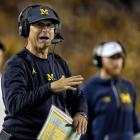Michigan coach Jim Harbaugh is a trailblazer. From the "Signing of the Stars" on National Signing Day, to team trips to Italy and France to sleepovers with high school prospects, the fourth-year coach of the Wolverines is always pushing the envelope.
His next step is figuring out how to pay players.
Speaking at a fundraiser in Toledo, Ohio, he tossed out the idea of "deferred compensation" that could be raised in a creative way.
"Can we get $1,000 of stock in Amazon possibly for deferred compensation?" he asked, according to ESPN.com. "We're just kind of wondering if it's possible. We don't know if it is yet. We're just asking the question."
Why deferred compensation and not a strict payment while they're still in school? For that answer, Harbaugh played the role of semi-pro accountant.
"I think that 1 percent that is able to play college football to get their education and get their degree is what's best for them," he said. "That's a lot and it should be valued as such. I worry about making them employees for the biggest reason, I believe, is because of that ability to be taxed."
The methods of how to pay players has been a hot topic this offseason.
Just last month, former United States Secretary of State and former College Football Playoff selection committee member Condoleezza Rice -- who the Commission on College Basketball that presented ideas last month on how to clean up the sport -- voiced support for players to profit off their likeness. In late March, NCAA president Mark Emmert mentioned the "Olympic model" as a possibility for players to take outside endorsement deals while keeping their amateur status.
Why Amazon? It's likely not a coincidence that he mentioned the company as an example. The media company followed the Michigan program throughout the 2017 season for the multi-part documentary "All or Nothing." When it comes to companies profiting off college athletics, Amazon is one of the latest in a long line of corporations that include apparel and shoe companies, television networks, radio networks, broadcast sponsors, conference-wide sponsors and local companies. They also paid Michigan $2 million for the access to make the documentary series.
It's clear that Harbaugh sees the future, understands that the evolving landscape of the financial side of collegiate athletics and is looking for a way for players across the country to be compensated more than they are now.
Maybe he'll be the voice that spurs change that is desperately needed.
















